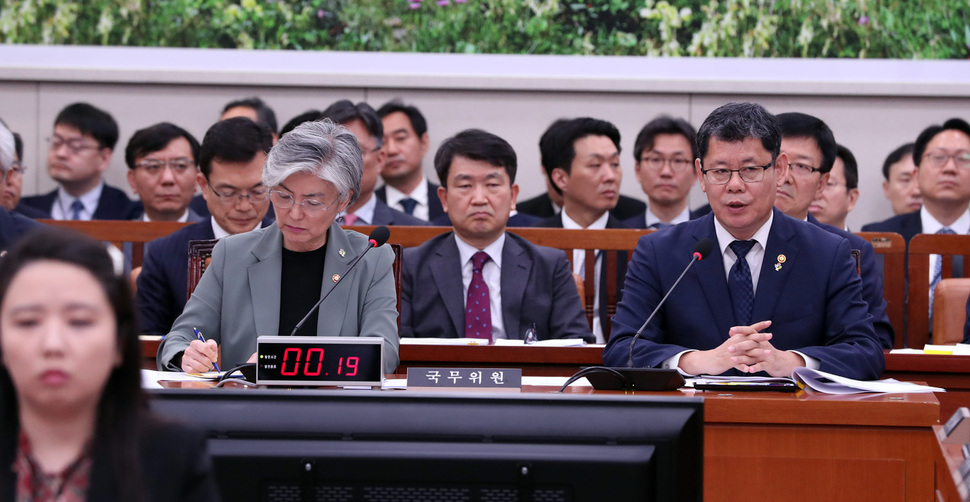 |
|
South Korean Unification Minister Kim Yeon-chul (right) answers questions from lawmakers during a Foreign Affairs and Unification Committee plenary session at the National Assembly on June 25. (Kim Gyoung-ho, staff photographer)
|
Discussions on S. Korea-Japan relations may happen after Japanese election
The Blue House announced on June 25 that South Korean President Moon Jae-in will not hold a summit meeting with Japanese Prime Minister Shinzo Abe during the upcoming G20 summit, which is set to take place in Osaka on June 28-29. With a series of conflicts over a judgment by the South Korean Supreme Court in October last year regarding compensation for Korean victims of forced labor under the Japanese colonial occupation, the targeting radar incident, and the import of maritime products from Fukushima, Korea-Japan relations are forecasted to remain icy for the time being. On this day, a senior official from the Blue House met with the press and said, “It does not appear that a Korea-Japan summit meeting will take place,” adding, “We are prepared to meet, but Japan does not seem to be ready. There was no response from the Japanese side.” However, he left the door open and put the ball in Japan’s court by saying, “If Japan requests a meeting at the venue [of the G20 summit], we can meet with Prime Minister Abe at any time.” Conflict over the judgment on compensation for victims of forced labor had a substantial impact on the failure to hold a summit meeting. “Japan told us to come up with a solution to the forced labor issue, but the Japanese government turned down the resolution we put forward,” the Blue House senior official said. Although the Korean government suggested that companies from both Japan and Korea voluntarily contribute funds to compensate the victims on June 19, the Japanese government rejected the proposal, stating that it was “completely unacceptable.” Abe leveraging S. Korea-Japan conflict ahead of House of Councillors election The Blue House believes that Abe is leveraging the conflict between Korea and Japan ahead of the upcoming House of Councillors election, in which half of the seats are up for election. In this situation, there is no need for Korea to obsess over holding a summit. Abe hinted at his intention to turn down a summit with Korea at an early stage through the press, stating that he had a “full schedule of summit meetings during the G20.” A Blue House official stated, “Prime Minister Abe is taking advantage of the Korean government to win over conservative and right wing voters in the election. It is Japan that will lose face as the host country (of the G20 summit).” In an appearance on KBS last month, Moon said, “I hope that South Korea-Japan relations will be able to further develop on the occasion of the new Japanese emperor taking the throne.” He then expressed regret over the current situation, adding that “Japanese political leaders often treat historical issues as domestic political matters, which has been a repeated obstacle to restoring bilateral relations.” The Blue House believes that it will be appropriate to engage in cool-headed discussions about improving bilateral relations in July after the House of Councillors election is finished, rather than during the G20 summit. Korean government not overly attached to bilateral summit Another reason why the Korean government is not overly attached to the idea of setting up a summit is the belief that it will be difficult for Japan to continue to seek division in Korea-Japan relations in the face of North Korea-US denuclearization talks and inter-Korean dialogue. When rapid progress was being made on denuclearization and the Korean Peninsula peace process last year, Abe became embroiled in the “Japan exclusion” controversy as the country was seemingly left out in the cold. Another factor is that Southeast Asia accounts for a growing proportion of South Korea’s exports, making the country less dependent on Japan than in the past. “Korea no longer relies on Japan in economic terms,” an official from the Blue House stated. “China, the US, and Southeast Asia are becoming our main trading partners.” With the Korea-Japan summit falling through, it appears that it will be difficult to make a breakthrough in bilateral relations in the near future. Two or three months are expected to pass before elderly victims of forced labor seek to confiscate assets from Nippon Steel and Mitsubishi Heavy Industries to convert into cash, and with the Japanese government having issued a warning about “response measures” if assets of Japanese companies are liquidated, bilateral relations may deteriorate even further. South Korean Foreign Minister Kang Kyung-wha appeared before a full meeting of the Foreign Affairs and Unification Committee of the National Assembly on June 25, stating, “If Japan engages in retaliatory action, our government cannot simply take it lying down,” adding, “We need to make thorough preparations and engage in discussions to prevent that situation from occurring.” By Seong Yeon-cheol and Park Min-hee, staff reporter Please direct comments or questions to [english@hani.co.kr]






